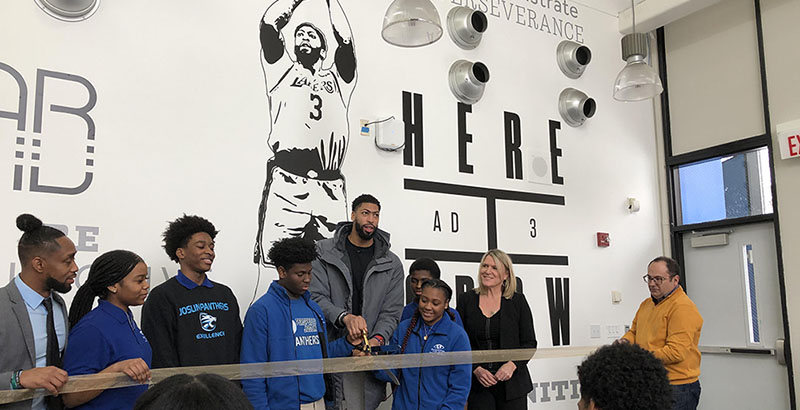Q&A — 3 Minutes With Charter School Founder Diana Shulla-Cose: An SEL Curriculum for a Lifetime, & Her School’s Most Famous Alum, Lakers Star Anthony Davis

This is one in an ongoing series of brief conversations with education innovators led by Greg Richmond, founder and former CEO of the National Association of Charter School Authorizers. His “Three Questions For” series also appears on Medium. Today’s edition: three minutes with Diana Shulla-Cose, co-founder and president of SEL-based Perspectives Charter School in Chicago.
Richmond: Twenty-three years ago, when you started Perspectives Charter School, many other schools were focusing on raising test scores. You went against the grain by proposing a school based on something called “A Disciplined Life.” What is “A Disciplined Life”?
Shulla-Cose: “A Disciplined Life” is our school culture, and it is created with deep intention. We have a set of 26 principles. We have a set of social, emotional and ethical core practices, and they sit under three buckets: self-perception, relationships and productivity.
We study these principles the way we study algorithms or revolutions and grapple with principles like: “Demonstrate honesty and integrity.” “Demonstrate a hard work ethic.” “Be reliable.” “Love who you are.” “Seek wisdom.” “Be open-minded.” “Respect the differences in others.” “Challenge each other intellectually.”
These are not just on our wall. They are studied by the adults in the building, by our teachers and support staff, our administration, our board members. We take it seriously as adults so we can strive to model and mirror our principles, and study our principles with our kids.
Over the past 20-plus years, we have built out a menu of interesting practices that help us develop social, emotional and ethical learning in our students. These practices are actions that we are trained to implement on a daily basis that build out this culture of trust and curiosity and high quality.
We spend 180 minutes in a class called “A Disciplined Life” every week. It’s very intentional that our kids leave at 18 years old, and our goal is not just to foster young leaders, but ethical leaders.
You can ask one of our 35-year-old graduates, Harold Watson, who is an educator today married with a kid and a dog, and he stands up at an event and says, “‘A Disciplined Life’ is my blueprint for life. Without these principles, I wouldn’t be the person I am.” Our kids leave at 18 carrying values and tools in their pocket to be persistent and to be able to problem-solve and manage challenging situations and make good decisions around the people they are with.
How has Perspectives’s focus on “A Disciplined Life” increased performance on traditional measures?
I think it has helped. When we look at a child holistically, we are truly working to teach that whole child. It’s about the EQ [emotional quotient] and the IQ. Our goal is for students to be intensive thinkers and increase their sense of agency. People who stay at Perspectives from sixth through 12th grade, their GPA is higher and they enroll in college at a higher rate.
It’s about building that trust and building that relationship. I think trust and relationship building are critical for kids to feel safe to be learners. That’s when the magic happens. Kids and teachers have to have that personal connection in the classroom so that remarkable learning and growth can take place. That spills into data looking better.
The other part of “A Disciplined Life” is productivity — get really strategic about how we go about making those scores go up. The idea of being productive is woven in: making sure you are reliable, and that you challenge each other intellectually, and that you are inquisitive. A school that is organized and has a level of respect and love for kids and for the craft of being a teacher really matters. I don’t think that just focusing on test scores gets you that side of the schooling equation.
Your most famous graduate is Anthony Davis. He was the college basketball Player of the Year in 2012. He won an Olympic gold medal. First pick in the NBA draft by the New Orleans Pelicans and now with the Los Angeles Lakers. Seven-time NBA All-Star. All that, yet Perspectives does not even have a gymnasium. How did that happen? How did Perspectives influence his career?
Anthony Davis came from a family where there is love and high expectations. And when that family realized they were raising the best basketball player in the country, they still would not pull him from Perspectives even though recruiters may not be showing up at his school.

He’s just a good guy. Because you come from that family and have all that support at home and you have a school that supports the same kind of values, it was great. Then he could go be a ballplayer. School came naturally for him. He’s smart. He was a real capable student. He is a thoughtful guy who was always humble. Really well-liked. Solid. Easy-going. Lovely young man who has shown that on and off the court.
When he went down to New Orleans, they did a whole piece on him and “A Disciplined Life.” In the NBA 2K video game, there is a scene of Anthony playing on a basketball court, and it is the “Anthony Davis ‘A Disciplined Life’ Basketball Court.” It is the playground right on our campus. Anthony had given us that court. Remember, this guy graduated from Perspectives and it was a school with no gym. So, he is a cool guy. We love him.
He was with us for seven years, from sixth grade through 12th, and his parents knew Perspectives was going to help him grow, not only as an intellectual but also as a human being. It was going to mirror the values in their home.
Greg Richmond is the founder of the National Association of Charter School Authorizers and a senior fellow at the Future Ed think tank at Georgetown University.
Get stories like these delivered straight to your inbox. Sign up for The 74 Newsletter

;)
